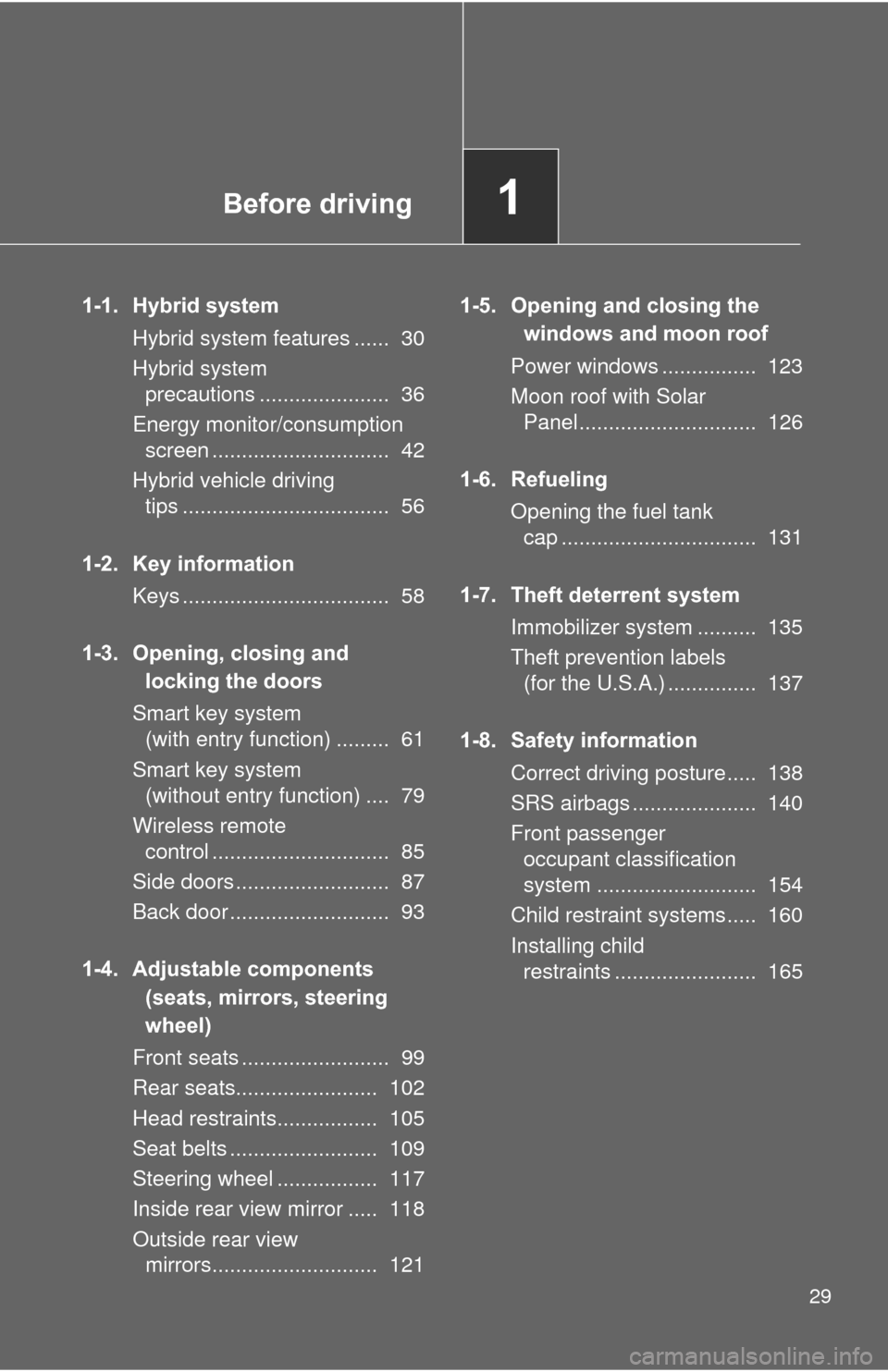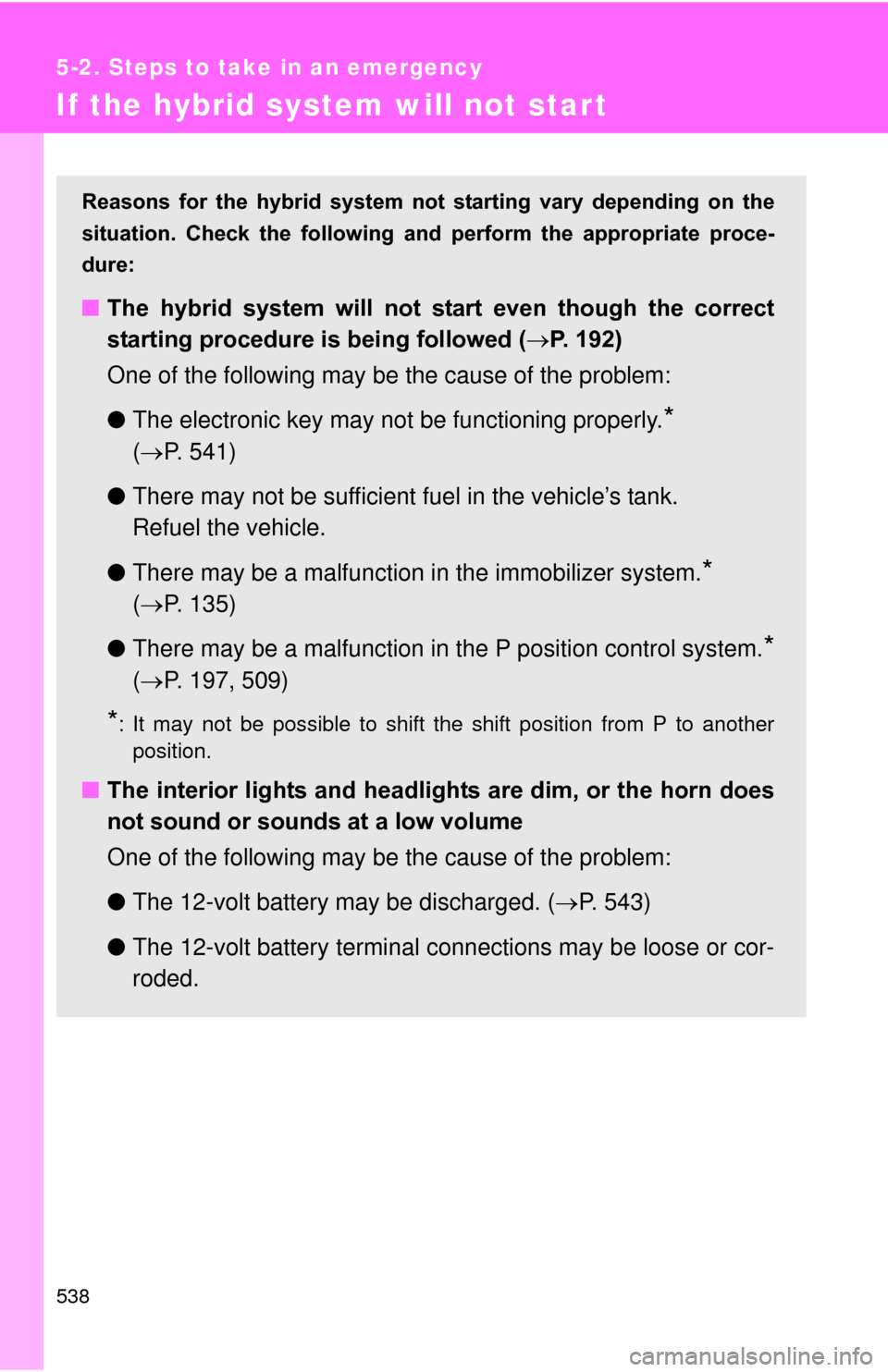Page 2 of 636

TABLE OF CONTENTSIndex
2
1-1. Hybrid systemHybrid system features ........ 30
Hybrid system precautions ........................ 36
Energy monitor/consumption screen ................................ 42
Hybrid vehicle driving tips ..................................... 56
1-2. Key information Keys ..................................... 58
1-3. Opening, closing and locking the doors
Smart key system (with entry function) ............ 61
Smart key system (without entry function) ....... 79
Wireless remote control ....... 85
Side doors ............................ 87
Back door ............................. 93
1-4. Adjustable components (seats, mirrors, steering
wheel)
Front seats ........................... 99
Rear seats .......................... 102
Head restraints ................... 105
Seat belts ........................... 109
Steering wheel ................... 117
Inside rear view mirror........ 118
Outside rear view mirrors .............................. 121 1-5. Opening and closing the
windows and moon roof
Power windows................... 123
Moon roof with Solar Panel ................................ 126
1-6. Refueling Opening the fuel tank cap .................................... 131
1-7. Theft deterrent system Immobilizer system ............. 135
Theft prevention labels (for the U.S.A.) ................. 137
1-8. Safety information Correct driving posture ....... 138
SRS airbags ....................... 140
Front passenger occupant classification system ......... 154
Child restraint systems ....... 160
Installing child restraints ..... 165
1Before driving
Page 29 of 636

Before driving1
29
1-1. Hybrid systemHybrid system features ...... 30
Hybrid system precautions ...................... 36
Energy monitor/consumption screen .............................. 42
Hybrid vehicle driving tips ................................... 56
1-2. Key information Keys ................................... 58
1-3. Opening, closing and locking the doors
Smart key system (with entry function) ......... 61
Smart key system (without entry function) .... 79
Wireless remote control .............................. 85
Side doors .......................... 87
Back door ........................... 93
1-4. Adjustable components (seats, mirrors, steering
wheel)
Front seats ......................... 99
Rear seats........................ 102
Head restraints................. 105
Seat belts ......................... 109
Steering wheel ................. 117
Inside rear view mirror ..... 118
Outside rear view mirrors............................ 121 1-5. Opening and closing the
windows and moon roof
Power windows ................ 123
Moon roof with Solar Panel.............................. 126
1-6. Refueling Opening the fuel tank cap ................................. 131
1-7. Theft deterrent system Immobilizer system .......... 135
Theft prevention labels (for the U.S.A.) ............... 137
1-8. Safety information Correct driving posture..... 138
SRS airbags ..................... 140
Front passenger occupant classification
system ........................... 154
Child restraint systems..... 160
Installing child restraints ........................ 165
Page 72 of 636

72 1-3. Opening, closing and locking the doors
■Conditions affecting operation
The smart key system, wireless remote control and immobilizer system use
weak radio waves. In the following situations, the communication between
the electronic key and the vehicle may be affected, preventing the smart key
system, wireless remote control and immobilizer system from operating
properly. (Ways of coping: P. 541)
● When the electronic key battery is depleted
● Near a TV tower, electric power plant, gas station, radio station, large dis-
play, airport or other facility that generates strong radio waves or electri-
cal noise
● When carrying a portable radio, ce llular phone, cordless phone or other
wireless communication devices
● When the electronic key is in contact with, or is covered by the following
metallic objects
• Cards to which aluminum foil is attached
• Cigarette boxes that have aluminum foil inside
• Metallic wallets or bags
• Coins
• Hand warmers made of metal
• Media such as CDs and DVDs
● When other wireless key (that emit radio waves) is being used nearby
● When carrying the electronic key together with the following devices that
emit radio waves
• Another vehicle’s electronic key or a wireless key that emits radio
waves
• Personal computers or personal digital assistants (PDAs)
• Digital audio players
• Portable game systems
● If window tint with a metallic content or metallic objects are attached to
the rear window
Page 135 of 636
135
1
Before driving
1-7. Theft deterrent system
Immobilizer system
■System maintenance
The vehicle has a maintenance-free type immobilizer system.
■ Conditions affecting operation
Depending on the surrounding environment and conditions, the immobilizer
system may not operate properly. This may prevent the hybrid system from
starting. ( P. 72)
The vehicle’s keys have built-in tr ansponder chips that prevent the
hybrid system from starting if a key has not been previously regis-
tered in the vehicle’s on-board computer.
Never leave the keys inside the vehicle when you leave the vehicle.
The indicator light flashes after
the “POWER” switch has been
turned off to indicate that the
system is operating.
The indicator light stops flash-
ing after the “POWER” switch
has been turned to ACCES-
SORY or ON mode to indicate
that the system has been can-
celed.
Page 136 of 636
136 1-7. Theft deterrent system
■Certifications for the immobilizer system
For vehicles sold in the U.S.A.
FCC ID: NI4TMIMB-1
This device complies with Part 15 of the FCC Rules. Operation is subject to
the following two conditions: (1) this device may not cause harmful interfer-
ence, and (2) this device must accept any interference received, including
interference that may cause undesired operation.
FCC WARNING:
Changes or modifications not expressly approved by the party responsible
for compliance could void the user’s authority to operate the equipment.
For vehicles sold in Canada
Operation is subject to the following two conditions: (1) this device may not
cause interference, and (2) this device must accept any interference, includ-
ing interference that may cause undesired operation of the device.
NOTICE
■To ensure the system operates correctly
Do not modify or remove the system.
If modified or removed, the proper operation of the system cannot be guar-
anteed.
Page 195 of 636

195
2-1. Driving procedures
2
When driving
■
Auto power off function
If the vehicle is left in ACCESSORY or ON mode (the hybrid system is not
operating) for more than an hour with the shift position in P, the “POWER”
switch will automatically turn off. However, this function cannot entirely pre-
vent the 12-volt battery from discharging. Do not leave the vehicle with the
“POWER” switch in ACCESSORY or ON mode for long periods of time when
the hybrid system is not operating.
■ Sounds and vibrations specific to a hybrid vehicle
P. 3 4
■ Electronic key battery depletion
P. 7 6
■ When the ambient temperature is low, such as during winter driving
conditions
The “READY” indicator may flash for a long time when the hybrid system\
is
starting. Driving will become possible once the “READY” indicator has illumi-
nated. Wait until the “READY” indicator has illuminated.
■ Conditions affecting operation
P. 7 2
■ Notes for the entry function
P. 7 3
■ If the hybrid system does not start
The immobilizer system may not have been deactivated. ( P. 135)
Contact your Toyota dealer.
Page 485 of 636
5
When trouble arises
485
5-1. Essential information
If your vehicle needs to be towed
Before towingThe following may indicate a problem with your hybrid transmission.
Contact your Toyota dealer before towing.
● The hybrid system is operating but the vehicle will not move.
● The vehicle makes an abnormal sound.
If there is a malfunction in the P position control system, the smart
key system or the immobilizer system , or if the 12-volt battery is dis-
charged, the vehicle cannot be tow ed with the front wheels on the
ground, as the front wheels may be locked. In this case, transport the
vehicle with both front wheels or all four wheels lifted.
If towing is necessary, we recommend having your vehicle towed by
your Toyota dealer or a commerci al towing service, using a lift-type
truck or flat bed truck.
Use a safety chain system for all to wing, and abide by all state/pro-
vincial and local laws.
Page 538 of 636

538
5-2. Steps to take in an emergency
If the hybrid system will not start
Reasons for the hybrid system not starting vary depending on the
situation. Check the following a nd perform the appropriate proce-
dure:
■ The hybrid system will not start even though the correct
starting procedure is being followed ( P. 192)
One of the following may be the cause of the problem:
● The electronic key may not be functioning properly.
*
( P. 541)
● There may not be sufficient fuel in the vehicle’s tank.
Refuel the vehicle.
● There may be a malfunction in the immobilizer system.
*
( P. 135)
● There may be a malfunction in the P position control system.
*
( P. 197, 509)
*: It may not be possible to shift the shift position from P to another
position.
■ The interior lights and headlights are dim, or the horn does
not sound or sounds at a low volume
One of the following may be the cause of the problem:
●The 12-volt battery may be discharged. ( P. 543)
● The 12-volt battery terminal c onnections may be loose or cor-
roded.